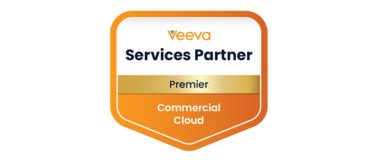
When is support good support?
Application support encompasses the maintenance and further development of IT applications with the aim of ensuring that the applications function reliably. The goal is to avoid malfunctions and continuously develop the applications. It is also important that users are able to use the application effectively at all times.
Application support is implemented by teams using ticket systems and knowledge bases at the 1st, 2nd, and 3rd levels—at Sycor, this is done in accordance with the ITIL standard.
As support teams in Sycor's Commercial Excellence division, we support the CRM systems (Veeva, Salesforce, IQVIA OCE, Ysura) of our customers in the life sciences industry. This includes both end-user support and support for stakeholders and key users on the business side (sales, medical, marketing, legal, etc.).
But what distinguishes support from good support?
It starts with first-level support: requests are received via various channels such as telephone, email, or self-service tickets and are processed as quickly as possible according to defined service times. In many cases, such as how-to questions and user errors, our goal is to resolve the user's issue immediately and thus achieve a high first-call resolution rate.

Ralph Michel, Service Manager
If requests are more complex or exceed the permissions of 1st level support, it is important to gather all relevant information and forward it to the downstream 2nd level support in the ticket system.
Important aspects here include: Which system is affected exactly? And which devices? In online and/or offline mode? Has synchronization taken place? Are there screenshots of error messages on the ticket? How long has the problem existed? Is one user affected or also direct colleagues? Are there obvious differences in permissions in the user account?
If several users report the same or similar issues, there may be a malfunction. In this case, direct communication with 2nd level support is more effective than forwarding individual cases via ticket. This allows the 2nd level team to prioritize fixing the malfunction and not be tied up with processing individual tickets. Our experience has shown that active communication between teams speeds up the resolution of malfunctions.
The 2nd level support team handles all tickets that cannot be resolved independently by the 1st level support team.
In addition to requests from the first level, the second level of support also handles tasks from the business side: When adjusting territories or adding new sales or medical lines, it is necessary to determine which data from old territories, such as customers and visit reports, should be transferred. For example, if new customers are to be added to or removed from territories using the Account Territory Loader, it is important to think ahead in order to provide good support. Structural changes go live on a specific date, for example, and preparations must be made with an appropriate time buffer, according to the motto: Trust is good, but control is better. When changing data, care is paramount, as without validation there is a risk of duplicates and inconsistencies that affect the functionality and data quality of the software.

If permissions are insufficient or functions of the affected application are disrupted, tickets are forwarded to 3rd level support and assigned different priorities depending on the extent of the issue. If the 3rd level support team has any questions, a short team meeting is usually more effective and efficient than communicating via the ticket system or email. Prioritizing tickets and requests helps to avoid long-term disruptions and promotes the effective use of the systems.
Acute disruptions must always be resolved as quickly as possible in accordance with the service level agreements.
Good support does not simply implement requests, but first weighs up their implications: Are there any reservations regarding compliance or other guidelines? Can the desired change be implemented without negatively impacting the existing running system? Do the users of the systems need instructions or even training for the implemented changes? For this reason, close coordination with the client and, if necessary, the Level 3 support team is essential. Changes must first be checked and tested in test systems before they can be implemented in the respective production system. At the same time, users must be informed of changes in good time.
In general, all changes to systems should be critically examined by support in a constructive manner. Will the desired goal be achieved without negative effects on the existing system? What needs to be adjusted to rule out unwanted side effects? Are the implementation costs proportional to the benefits, or could the goal also be achieved with alternative solutions?
In a good support team, the tasks of support and consulting are not separate, but coexist. It is always important to weigh up the potential effects of changes, point them out, and agree on how negative effects can be effectively avoided. The ultimate goal is reliable and trouble-free functioning of the application, enabling effective use by users.
Last but not least, good support depends on professional service management: this coordinates the support team employees, controls the continuous transfer of knowledge, and regularly informs the client about ticket numbers, solution rates, and optimization potential.
Would you like to learn more about Sycor application support?
Your contact
Do you have questions on this topic, would you like more information and are you looking for an expert to help you?

Our partners
All partners










